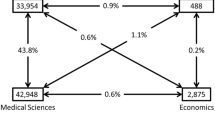Abstract
In this commentary on the special issue, I join the authors in searching for a conceptual framework that would clarify the concepts of metacognition, self-regulation, and self-regulated learning. Building on the insights of the different articles, I suggest that metacognition, self-regulation, and self-regulated learning should be considered as subtypes of the general, abstract, phenomenon of self-regulated action. I continue by questioning the benefit of seeking boundaries between these three concepts. Instead, I propose to search for dimensions along which types of self-regulated action vary. I, then, introduce the notion of a “multidimensional conceptual space of self-regulated action” as a conceptual tool that allows for diversity of conceptions of self-regulated action while maintaining conceptual clarity. I conclude by highlighting the central role of purpose of engagement in self-regulated action and by noting its potential for guiding the search for meaningful dimensions on which to typify self-regulation.
Similar content being viewed by others
References
Alexander, P. A. (2008). Introduction to the special issue. Metacognition, self-regulation, and self-regulated learning: Historical roots and contemporary manifestations. Educational Psychology Review, 20, 369–372. doi:10.1007/s10648-008-9089-0.
Carver, C. S., & Scheier, M. F. (1981). Attention and self-regulation: a control-theory approach to human behavior. New York: Springer.
Diaz, R. M., Neal, C. J., & Amaya-Williams, M. (1990). The social origins of self-regulation. In L. C. Moll (Ed.), Vygotsky and education: Instructional implications and applications of sociohistorical psychology (pp. 127–154). Cambridge: Cambridge University Press.
Dinsmore, D. L., Alexander, P. A., & Loughlin, S. M. (2008) Focusing the conceptual lens on metacognition, self-regulation, and self-regulated learning. Educational Psychology Review, 20, 391–409. doi:10.1007/s10648-008-9083-6.
Flum, H., & Kaplan, A. (2006). Exploratory orientation as an educational goal. Educational Psychologist, 41, 99–110. doi:10.1207/s15326985ep4102_3.
Fox, E., & Riconscente, M. M. (2008). Metacognition and self-regulation in James, Piaget, and Vygotsky. Educational Psychology Review, 20, 373–389. doi:10.1007/s10648-008-9079-2.
James, W. (1890). The principles of psychology. New York: Holt.
Kaplan, A., & Maehr, M. L. (2002). Adolescents’ achievement goals: Situating motivation in socio-cultural contexts. In F. Pajaers, & T. Urdan (Eds.), Adolescence and education: Vol. 2, Academic motivation of adolescents (pp. 125–167). Greenwich: Information Age.
Kaplan, A., Lichtinger, E., & Gorodetsky, M. (2008). Achievement goal orientations and self-regulation in writing: An integrative perspective. Journal of Educational Psychology, in press.
Loyens, S. M. M., Magda, J., & Rikers, R. M. J. P. (2008). Self-directed learning in problem-based learning and its relationships with self-regulated learning. Educational Psychology Review, 40, 411–427. doi:10.1007/s10648-008-9082-7.
Maehr, M. L. (1984). Meaning and motivation: Toward a theory of personal investment. In C. Ames, & R. Ames (Eds.), Research on motivation in education (Vol. 1, pp. 115–144). New York: Academic.
Maggioni, L., & Parkinson, M. M. (2008). The role of teacher epistemic cognition, epistemic beliefs, and calibration in instruction. Educational Psychology Review, 40, 445–461. doi:10.1007/s10648-008-9081-8.
Markus, H. R., & Kitayama, S. (1991). Culture and the self: Implications for cognition, emotion, and motivation. Psychological Review, 98, 223–253. doi:10.1037/0033-295X.98.2.224.
McCaslin, M. (2004). Coregulation of opportunity, activity, and identity in student motivation: Elaborations on Vygotskian themes. In D. M. McInerney, & S. Van Etten (Eds.), Research on sociocultural influences on motivation and learning: Big theories revisited (Vol. 4, pp. 249–274). Greenwich: Information Age.
Nicholls, J. G. (1989). The competitive ethos and democratic education. Cambridge: Harvard University Press.
Roeser, R. W., Peck, S. C., & Nasir, N. S. (2006). Self and identity processes in school motivation, learning, and achievement. In P. A. Alexander, & P. H. Winne (Eds.), Handbook of educational psychology (2nd ed., pp. 391–424). Mahwah: Erlbaum.
Ryan, R. M., & Deci, E. L. (2000). Self-determination theory and the facilitation of intrinsic motivation, social development, and well-being. The American Psychologist, 55, 68–78. doi:10.1037/0003-066X.55.1.68.
Tajfel, H., & Turner, J. C. (1986). The social identity theory of intergroup behavior. In S. Worchel, & W. G. Austin (Eds.), Psychology of intergroup relations (pp. 7–24). Chicago: Nelson-Hall.
Winters, F. I., Greene, J. A., & Costich, C. M. (2008). Self-regulation of learning within computer-based learning environments: A critical analysis. Educational Psychology Review, 40, 429–444. doi:10.1007/s10648-008-9080-9.
Author information
Authors and Affiliations
Corresponding author
Rights and permissions
About this article
Cite this article
Kaplan, A. Clarifying Metacognition, Self-Regulation, and Self-Regulated Learning: What’s the Purpose?. Educ Psychol Rev 20, 477–484 (2008). https://doi.org/10.1007/s10648-008-9087-2
Received:
Accepted:
Published:
Issue Date:
DOI: https://doi.org/10.1007/s10648-008-9087-2




